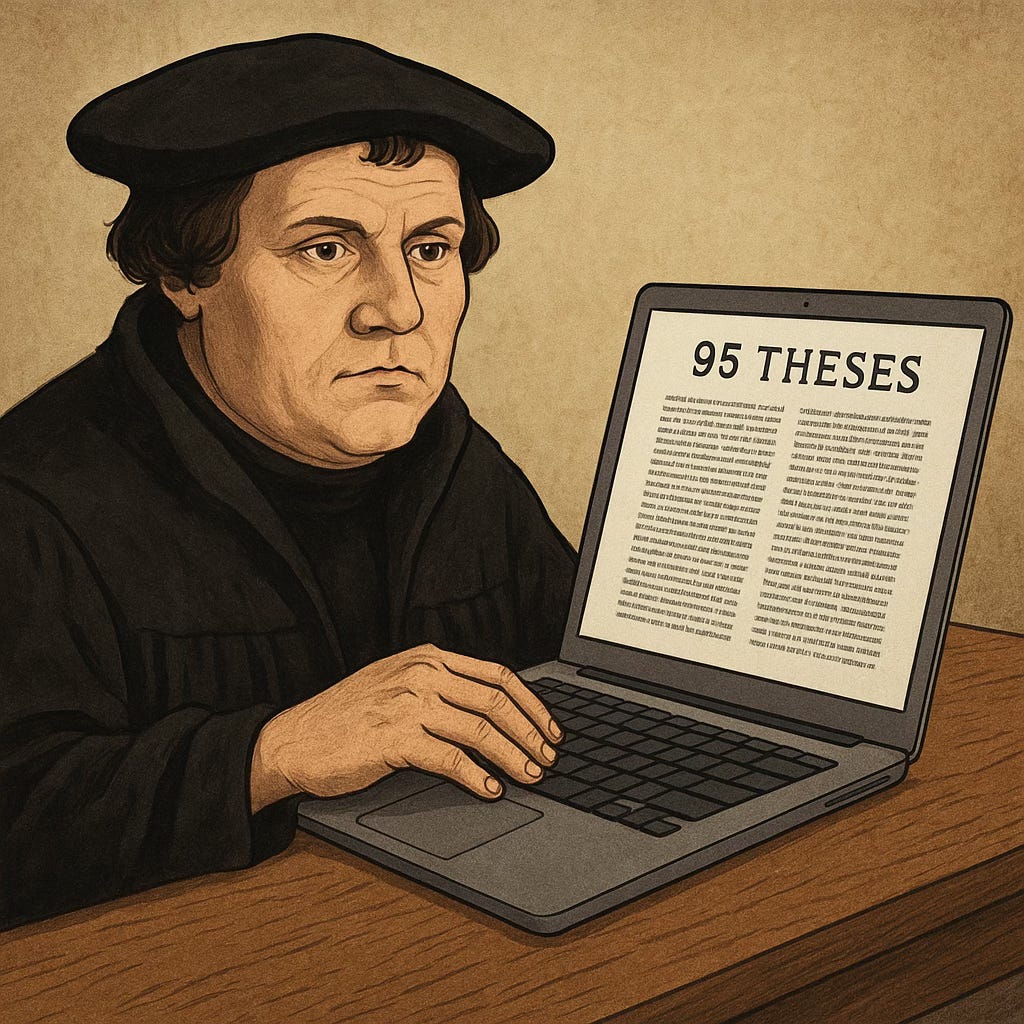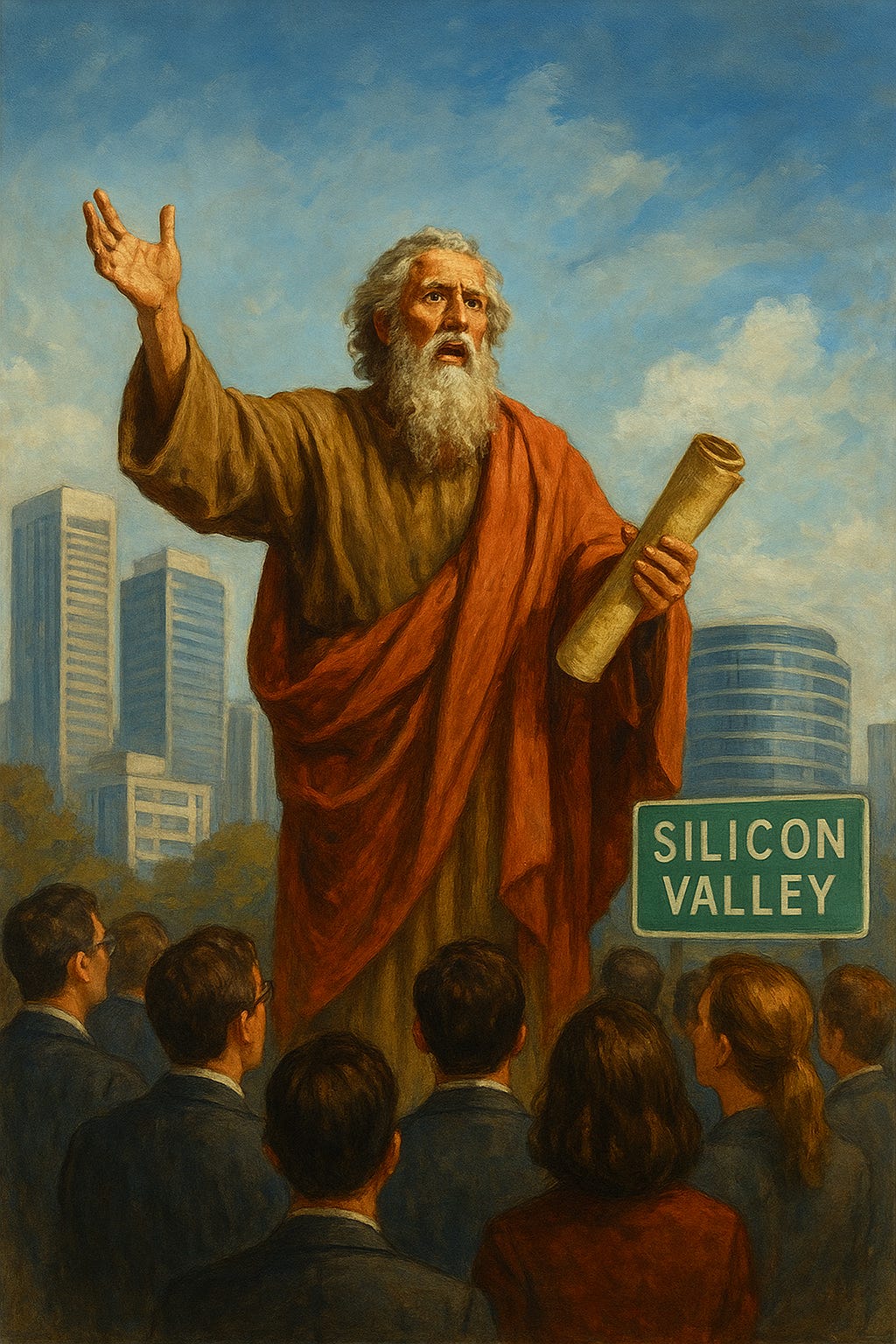"I Will Write it on Their AI Drives"
The New Reformation Prompted by AI
This Sunday, the congregations in the Lutheran expression of Christianity will commemorate the Protestant Reformation. On October 31, 1517, Martin Luther, an Augustinian priest and theology professor in Wittenberg, Germany, posted what became known as the 95 theses. They were a list of questions and statements focused on the practice of indulgences, the sale of eternal promises. Through a combination of technology, the Gutenberg printing press, cultural shifts, the emerging Renaissance, and a series of political/economic dislocations of the peasantry, these 95 theses ignited a reforming of the church and a revolution in European society.
In many ways, our current times can feel ripe for reform. Canadian philosopher Sean McGrath has written extensively about how Carl Jung’s psychology interacts with contemporary society and theological studies. Recently, he has turned his attention to Artificial Intelligence’s impact on humanity, suggesting it may result in a decline or eclipse of thinking. Simultaneously, a new form of religion is emerging in Silicon Valley, the center of the AI revolution. Douglas Rushkoff focused on this emergence. He is a media theorist, author, and documentarian who has become one of the most incisive critics of Silicon Valley’s quasi-religious mindset.
Rushkoff’s analysis provides concrete evidence for McGrath’s more philosophical concerns. When McGrath asks whether we’re “looking for new gods after Christianity,” Rushkoff shows us exactly what those new gods look like: algorithms that promise optimization, AIs that promise transcendence, and technologies that promise escape from human limitation.
Both thinkers recognize that we’re dealing with something more profound than technological change. We’re witnessing the emergence of new forms of religious consciousness that fundamentally reject rather than celebrate human nature. Where traditional religions typically sought to perfect or redeem humanity, these digital spiritualities seek to replace it entirely.
As our religious ideologies face potential reformation, consulting ancient prophetic voices grows more urgent. The Hebrew Bible’s Jeremiah faced corruption, political instability, and the false prophets questioning truth in an age of propaganda. It seems to me he might offer some wisdom.
Among the Reformation Sunday scripture readings is this verse from Jeremiah 31:31-34.
31 The days are surely coming, says the Lord, when I will make a new covenant with the house of Israel and the house of Judah. 32 It will not be like the covenant that I made with their ancestors when I took them by the hand to bring them out of the land of Egypt—a covenant that they broke, though I was their husband, says the Lord. 33 But this is the covenant that I will make with the house of Israel after those days, says the Lord: I will put my law within them, and I will write it on their hearts, and I will be their God, and they shall be my people. 34 No longer shall they teach one another or say to each other, “Know the Lord,” for they shall all know me, from the least of them to the greatest, says the Lord, for I will forgive their iniquity and remember their sin no more.
Jeremiah 31 speaks to a people exiled from their homeland and from their own sense of identity. Amid the ruins, the prophet utters a promise: “The days are surely coming, says the Lord, when I will make a new covenant … I will put my law within them, and I will write it on their hearts.” The shift is profound. The divine word will no longer dwell on tablets of stone or in institutions of control but within the living interiority of persons. Meaning will no longer be outsourced to external media; it will become inscribed in the depths of consciousness itself.
In our current era, the promise of interior meaning faces a new kind of exile. As Sean McGrath warns, the digital age tempts us to outsource not just memory or communication but thinking itself. Through what he calls datafication—the conversion of lived experience into informational code—human beings risk forgetting that language is not a mere signal but a medium of spirit. In this very place, the self encounters the world. The covenant written on the heart becomes, in this new dispensation, a contract stored on the cloud, potentially leading to a loss of the human element.
Douglas Rushkoff describes Silicon Valley’s dream of transcendence through technology as a ‘techno-utopian rapture.’ What Jeremiah saw as divine renewal, the technologist recasts as digital salvation: eternal life reimagined as perpetual upgrade. The new gods are algorithms promising mastery over mortality. Yet these digital covenants demand no love, no justice, no community—only compliance with code. In this sense, the ‘law written on the heart’ has been displaced by a law compiled in software, impersonal and unmerciful, potentially leading to a lack of connection.
Against this eclipse, Jeremiah’s oracle can be read as both rebuke and invitation. The prophet’s promise does not abolish language or thought but re-centers them in the living subject. The heart becomes the dwelling place of meaning—the site of intensive signification, to borrow McGrath’s term—where words are not mere data but living expressions of relationship. “I will be their God, and they shall be my people” is not information to be stored but a vow enacted through mutual recognition.
Jeremiah’s vision thus anticipates McGrath’s expressivism: actual knowledge is participatory, born of communion, not computation. In the prophetic imagination, to know God is not to process divine data but to be known by God—to dwell within a shared field of meaning. McGrath’s expressivism, on the other hand, emphasizes the importance of personal experience and the expression of one’s thoughts and feelings. The same holds for our humanity: we do not create meaning ex nihilo; we discover ourselves within it, as language reveals us to one another.
To recover Jeremiah’s covenant in an age of machines is to resist the seduction of what Rushkoff calls “The Mindset”—the fantasy that salvation lies in escaping the human condition. Jeremiah insists that salvation is not escape but renewal from within. The divine inscription on the heart is the antithesis of the algorithmic inscription on the server: one restores presence, the other multiplies absence.
If the digital age marks what McGrath calls the “eclipse of thinking,” then Jeremiah 31 offers the counter-movement: the dawn of remembering. It recalls us to the interior covenant—the capacity to speak, to mean, to love—that no machine can simulate. The prophetic promise still stands: that even amid data and exile, the law of love may yet be written again, not in code, but in the living language of the human heart.
More to Come,
James Hazelwood is an author and documentary photographer living in Rhode Island.






Provocative. Frightening. Helpful. Not sure why but this goes hand in hand with Bp. Wayne Miller’s post today on FB. Where is our grounding?